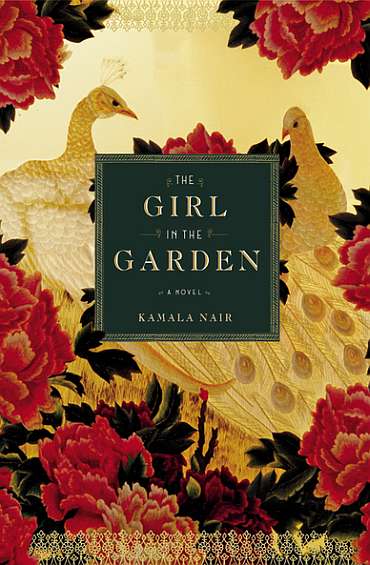 | « Back to article | Print this article |
'The themes of my novel are universal'
Debutante novelist Kamala Nair speaks to Arthur J Pais
In Kamala Nair's engaging novel The Girl in the Garden, a young woman unsure of her engagement is revisiting the events of a childhood summer when her beautiful yet troubled mother spirits her away from her home to a magical Indian village. But the ancestral house in the middle of an idyllic garden harbors a terrible secret.
Nair, who was born in London, the United Kingdom and grew up in the United States, is a graduate of Wellesley College. She studied literature at Oxford University and received an MPhil in creative writing from Trinity College Dublin, Ireland, in 2005. She recently gave up her job with Elle D cor to be a full-time writer.
You are an American kid... What aspects of Indian culture ingrained in you have helped you in your growth as an American?
There is a clich that Indian parents push their children toward academic excellence, and for me, I personally benefited from that emphasis on education. It wasn't an option for me to slack off in school, and as a result I was really able to make the most of my education, which has helped me as a person and as a writer.
What do you like the best about your Indian upbringing and what do you like the least?
I like having an intimate connection with two strikingly different cultures and countries. From a writing perspective, being exposed to both American and Indian cultures has given me a wider net of experience and observations from which to draw.
Since my parents came from India, I have a much more direct relationship with my country of origin than many of my peers whose families emigrated generations ago, which I feel lucky about, and I enjoy the feeling of community and support among my fellow Indians and Indian Americans.
What I like least... growing up as an Indian in a very homogenous environment was culturally confusing. In many ways, I felt just as American as my friends, but there was also this difference, and I knew that others did not see me in the same way.
When we first moved to Minnesota, my mother took me to register for the eighth grade and the woman at the desk took one look at me and asked if I'd be signing up for English as Second Language cl-asses. I had many such experiences.
On top of that, my parents had stricter rules than the parents of my non-Indian friends, and while I can now understand where they were coming from, at the time it could be alienating.
Your book is set in Kerala. How did you get to know Kerala?
I grew up in small American towns without a substantial Indian community, so my parents paid particular attention to exposing my sister and me to Indian culture. We visited Kerala every few years during school vacations, and had the opportunity to get to know our extended family and observe the way of life there firsthand.
Both sets of grandparents came to visit over the years, and spent a significant amount of time with us, which also helped. When we went to India, we usually spent a couple of weeks with my mother's family in the city, and a couple of weeks in my father's village, so we were exposed to two very different worlds within one small state.
My memories and observations from those trips are some of the most powerful from my childhood.
Click NEXT to read further...
'Kerala was unlike anywhere else I had ever been'
How has your interest in India and Indian culture remained strong?
When I got to college, I discovered an active community of South Asians, many of whom had grown up in the US like me, and I participated in our annual cultural show.
There are also many classic novels by South Asian authors that have inspired me over the years, including The God of Small Things by Arundhati Roy, A Suitable Boy by Vikram Seth, and Midnight's Children by Salman Rushdie.
How did this novel come about?
The idea for this novel came to me during a family trip to Kerala, India, while I was in the midst of a creative writing graduate course in Ireland. We were in the small village where my father grew up, a place I had often visited as a child.
It was unlike anywhere else I had ever been, and over the years I heard many fascinating stories and superstitions. One night I accompanied some of my relatives to the village temple after dark, and one of my cousins pointed out an old stone well in a moonlit field next to the temple.
She told me it was haunted by a yekshi, or a ghost. Later that night I had a vivid dream about that field and the well, but in my dream there was also a tree covered with red flowers, and two small girls huddled underneath.
I wanted to know who those girls were and why they were there. My story grew from that image. I was also inspired by the childhood classic The Secret Garden by Frances Hodgson Burnett.
I was drawn to the idea of this once grand, now crumbling estate harboring a forsaken garden, and how the garden becomes the source of redemption for this broken family. I wanted to explore a similar idea in a darker way for adults, and through a different cultural lens.
What do you expect readers of Indian origin to take from your novel? And the non-Indians?
Many of Rakhee's observations are inspired by my own memories of visiting India as a child, and feeling both fascinated and utterly out of place, something that will be familiar to any Indian who grew up in the US.
Ultimately the themes of my novel are universal and I hope people of all origins can relate. It is essentially about the passage between childhood and adulthood, and that defining and often terrifying moment when a child discovers that her parents are both human and fallible.
It's a story about family and the bonds that hold us together, and the weaknesses that tear us apart. At its core, it's a story about the complicated love between mothers and daughters.
Click NEXT to read further...
'We are global citizens, and our daughters have inherited that spirit'
Sree Nair and his wife Lathika Nair decided long ago that it was important to make their two daughters independent. New Zealand-born Kavitha and London, United Kingdom-born Kamala were kids when they arrived in the United States.
The Nairs spent a few years Rochester, New York, and Burlington, Vermont, and then moved to Rochester, Minnesota, their home for 18 years.
"The girls were encouraged to do the things on their own and discuss openly with us whatever interested them or what ever bothered them," said Sree, an endocrinologist at the Mayo Clinic.
His wife works part-time as a banker at Wells Fargo. "We also gave them discipline; they could not watch TV shows during their weekdays, unless it was a news program."
The girls grew up with American and Indian culture, Lathika said.
"In Rochester, New York, there were many successful Indian families who had lived in the area for over two decades," Lathika said. "They were very successful and yet they also maintained their Indian culture. Many had continued to be vegetarians. They were excellent role models to our children."
Sree, who like Lathika was born and raised in Kerala, said the family had a kind of nomadic life.
"We have also lived in Sweden for a few months," he said. "We learned quickly how to adjust to the world around us but also how to retain our own heritage. We are global citizens and I think our daughters have inherited that spirit."
Both daughters have studied at prestigious universities including Oxford. Kamala's first novel, The Girl in the Garden, has just been published by Houghton Mifflin. Kavitha too started with literature, branched into an MBA at Yale, and works for a major hospital in New York where her doctor husband also works.
Growing up bicultural was not easy for the girls, but the parents were not much aware of their daughters' dilemma.
"We came to know from Kavitha when she was in college that she did undergo an identity crisis," Sree said. "We did not tell them what they should do career-wise, but when Kamala decided to study English literature I did have a discussion with her about her career options."
Taking their daughters to India was not an obligation to connect them with their family members in Kerala, the Nairs say. The trips were like adventures, and the girls got to enjoy their sojourns.
Kamala loves talking about the vegetarian delicacies she began enjoying there.
"When my parents hosted a potluck lunch last month at their Minnesota home in honor of Vishu, an annual festival celebrated in Kerala, I was reminded of those marathon meals," she blogged.
"The weather that day was dreary. The wind howled against the window, and all the guests arrived wearing thick jackets. And yet, I couldn't help but feel transported back to those childhood visits when I saw and tasted the extensive meal."

